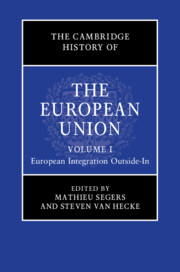Book contents
- The Cambridge History of the European Union
- The Cambridge History of the European Union
- The Cambridge History of the European Union
- Copyright page
- Contents
- Figures
- Contributors to Volume I
- Acknowledgements
- Abbreviations
- Reflections on the History and Historiography of European Integration
- Part I Critical Junctures
- Part II Multilateralism and Geopolitics
- Part III Perspectives and Ideas
- Networks and Attitudes
- 18 Researching the Eurocrats
- 19 Elite Networks of Allegiance
- 20 The Multidimensional Nature of Public EU Attitudes
- Thinking and Memory
- Culture and Religion
- Index
- References
19 - Elite Networks of Allegiance
from Networks and Attitudes
Published online by Cambridge University Press: 21 October 2023
- The Cambridge History of the European Union
- The Cambridge History of the European Union
- The Cambridge History of the European Union
- Copyright page
- Contents
- Figures
- Contributors to Volume I
- Acknowledgements
- Abbreviations
- Reflections on the History and Historiography of European Integration
- Part I Critical Junctures
- Part II Multilateralism and Geopolitics
- Part III Perspectives and Ideas
- Networks and Attitudes
- 18 Researching the Eurocrats
- 19 Elite Networks of Allegiance
- 20 The Multidimensional Nature of Public EU Attitudes
- Thinking and Memory
- Culture and Religion
- Index
- References
Summary
The narrative of European integration was long dominated by the role of the participating member states, as personified in their respective presidents and prime ministers, in forging an ever-expanding set of institutions and an increasingly dense legal framework. This orthodox view saw nation states at the centre of the process, gradually pooling sovereignty to construct an ever-closer union. Analyses have differed as to the driving forces behind these processes. Debates in the 1990s between advocates of intergovernmentalism and supranationalism as the guiding explanatory frameworks still focused on an apparently self-contained European context, although the role of non-state actors did begin to feature more in the analysis. In contrast, more recent scholarship has contested the way the history of European integration has generally been framed in isolation from wider social, economic and political developments. Repositioning the processes of European integration in a global context requires that Europe as an historical entity be ‘provincialised’.
- Type
- Chapter
- Information
- The Cambridge History of the European Union , pp. 494 - 515Publisher: Cambridge University PressPrint publication year: 2023



